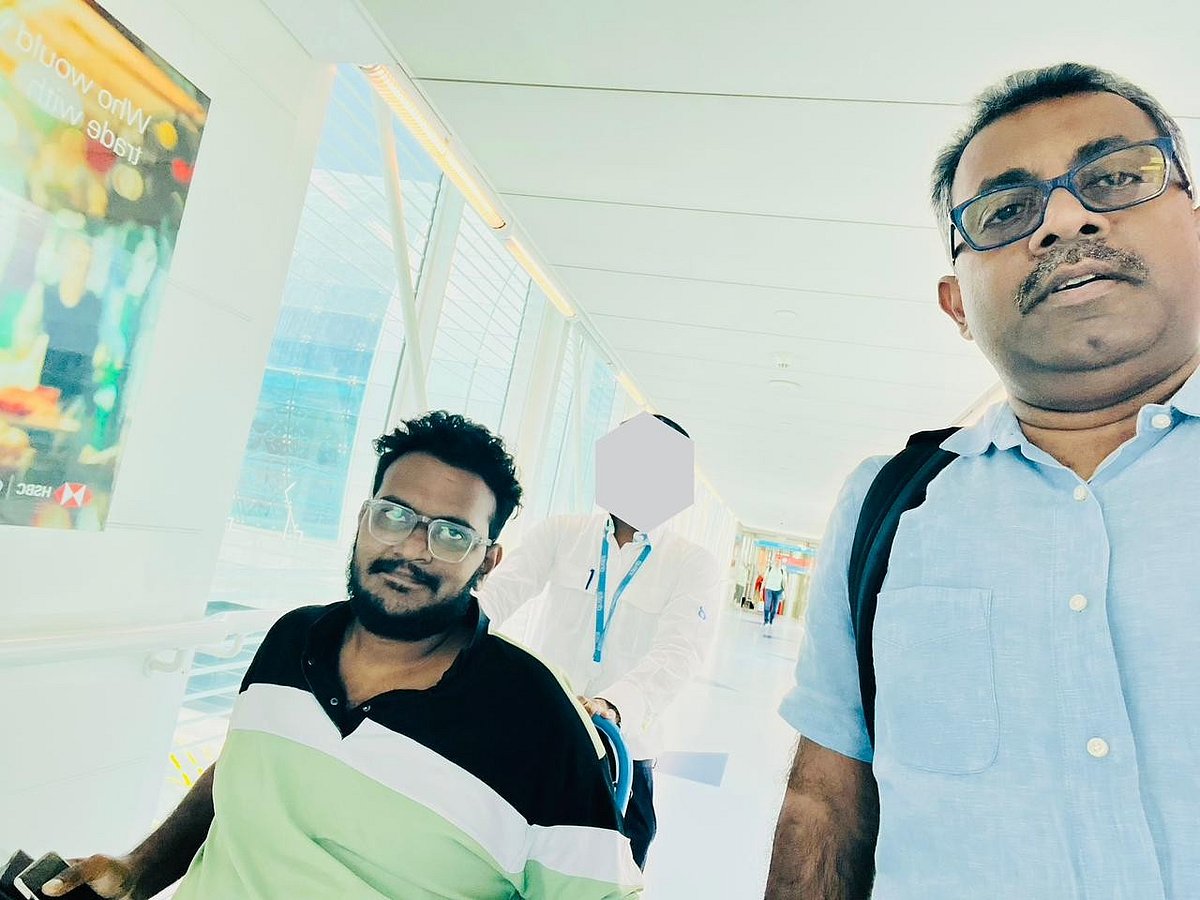UAE: Young Indian left unable to walk after meningitis, repatriated ahead of World Meningitis Day
Hospital waives bills as community, Indian Consulate in Dubai rally to fly 26-yr-old home

Dubai: A young Indian man who travelled to the UAE in July seeking employment has been left unable to walk after a devastating bout of acute bacterial meningitis that struck six weeks after his arrival.
Sai Krishna V, a 26-year-old diploma holder in tool and die making, arrived in Dubai on July 16 on a visit visa.
While a plastic manufacturing company that offered him a job as a technician prepared to process his work permit, he developed a high fever on August 28 that would change his life forever.
“I have no idea how I got the infection, and I never imagined I would end up in this situation,” Sai told Gulf News from his hospital bed in his hometown of Vijayawada, Andhra Pradesh, where he continues to receive treatment.
“My company was just about to start the visa procedures when I fell sick,” he said, describing the unfortunate timing of his illness.
Rapid deterioration
What began as a fever quickly escalated into severe symptoms including ear infection, neck stiffness, and eventually loss of consciousness. On the night of September 2, his colleagues found him unconscious in his accommodation and rushed him to a hospital in Dubai.
Medical reports revealed the severity of his condition: acute bacterial (pneumococcal) meningitis with leptomeningitis and hydrocephalus, acute ischemic infarcts, and secondary acute suppurative otitis media with bilateral tympanic membrane perforation.
This meant he had a serious bacterial brain infection that caused fluid buildup, stroke-like brain damage, and severe infections in both ears.
Meningitis, an inflammation of the tissues surrounding the brain and spinal cord, remains a serious global health threat. The disease can be fatal in just 24 hours and one in five survivors faces long-term challenges such as hearing loss, cognitive difficulties, and physical disabilities. It spreads through respiratory droplets or throat secretions.
Hospital isolation
By the time he was hospitalised, the infection had already begun its devastating assault on Sai’s nervous system.
He remained hospitalised for 27 days, much of it in isolation. “Since it is a contagious disease, nobody was allowed to see me,” he recalled, describing the lonely ordeal that lasted nearly a month.
He underwent 21 days of intensive antibiotic treatment that cleared the infection, but the damage had been done. The disease left him with bilateral lower-limb weakness, robbing him of his ability to walk.
Community compassion
The turning point came when community volunteers and the Indian Consulate in Dubai learned of his plight. Praveen Kumar, a community volunteer working in coordination with the consulate, accompanied Sai on his repatriation flight.
Praveen said Sai’s medical bills were waived by the hospital after recognising that he was on a visit visa without health insurance and the Indian Consulate funded his repatriation tickets through the Indian Community Welfare Fund.
“Watching him being transported from the hospital to the airport, onto the plane, and then to the ambulance in Hyderabad was heartbreaking,” he said.
Praveen praised the Emirates cabin crew of flight EK 528 from Dubai to Hyderabad on September 29 for their exceptional care. “They treated him with great compassion, even though helping him into his seat required tremendous effort.
He added that the case also highlighted the need for job seekers to arrive only on employment visas, which help secure residency status and medical insurance sooner, as repeatedly reminded by Indian and local authorities.
Uncertain future
After reaching home, Sai was admitted to a local hospital in Vijayawada, where doctors conducted fresh tests to assess his condition and plan further treatment.
Now bedridden, Sai faces an uncertain future. While he expressed gratitude to his colleagues, the volunteer, the consulate, and the cabin crew for their support, his voice carried worry about what lies ahead. The young man must now focus on regaining basic mobility.
Global health challenge
Sai’s case emerged just ahead of World Meningitis Day, observed annually on October 5. This year’s observance carries special significance as the World Health Organisation (WHO) officially launched a regional framework to defeat meningitis by 2030 in the WHO Eastern Mediterranean Region, which includes the UAE.
The new framework aims to eliminate bacterial meningitis epidemics, reduce deaths from vaccine-preventable meningitis by 70 per cent, and improve care and quality of life for survivors by 2030. It aligns with the global roadmap endorsed by the 73rd World Health Assembly in 2020.
According to the WHO, full implementation of the roadmap could prevent 2.75 million cases, save 190,000 lives, avert 780,000 disabilities, and generate up to $100 billion in economic benefits by 2030.
Vaccination for meningitis
The WHO recommends vaccination for certain bacterial meningitis types and hygiene practices to prevent its spread.
Vaccination against meningitis is mandatory for Hajj and Umrah pilgrims from the UAE.
According to the Ministry of Health and Prevention (MoHAP) website, the National Immunisation Programme in 2019 approved the addition of the meningitis vaccine for school students at the age of 16 to 18 years, to be given to grade 11 students.
While meningitis is not very common in the UAE, cases do occur. A previously reported study in Al Ain reviewed cases over five years and identified 92, of whom 19 were under 20 years old. The study found that the annual rate declined from a peak of 35 cases to a low of five per year, with children under five at greatest risk.
Network Links
GN StoreDownload our app
© Al Nisr Publishing LLC 2026. All rights reserved.